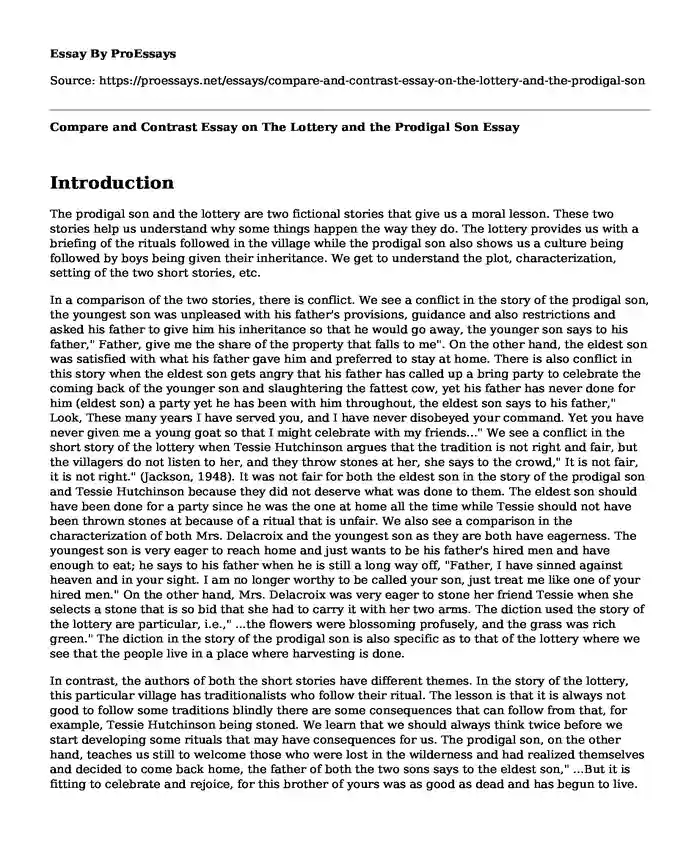Introduction
The prodigal son and the lottery are two fictional stories that give us a moral lesson. These two stories help us understand why some things happen the way they do. The lottery provides us with a briefing of the rituals followed in the village while the prodigal son also shows us a culture being followed by boys being given their inheritance. We get to understand the plot, characterization, setting of the two short stories, etc.
In a comparison of the two stories, there is conflict. We see a conflict in the story of the prodigal son, the youngest son was unpleased with his father's provisions, guidance and also restrictions and asked his father to give him his inheritance so that he would go away, the younger son says to his father," Father, give me the share of the property that falls to me". On the other hand, the eldest son was satisfied with what his father gave him and preferred to stay at home. There is also conflict in this story when the eldest son gets angry that his father has called up a bring party to celebrate the coming back of the younger son and slaughtering the fattest cow, yet his father has never done for him (eldest son) a party yet he has been with him throughout, the eldest son says to his father," Look, These many years I have served you, and I have never disobeyed your command. Yet you have never given me a young goat so that I might celebrate with my friends..." We see a conflict in the short story of the lottery when Tessie Hutchinson argues that the tradition is not right and fair, but the villagers do not listen to her, and they throw stones at her, she says to the crowd," It is not fair, it is not right." (Jackson, 1948). It was not fair for both the eldest son in the story of the prodigal son and Tessie Hutchinson because they did not deserve what was done to them. The eldest son should have been done for a party since he was the one at home all the time while Tessie should not have been thrown stones at because of a ritual that is unfair. We also see a comparison in the characterization of both Mrs. Delacroix and the youngest son as they are both have eagerness. The youngest son is very eager to reach home and just wants to be his father's hired men and have enough to eat; he says to his father when he is still a long way off, "Father, I have sinned against heaven and in your sight. I am no longer worthy to be called your son, just treat me like one of your hired men." On the other hand, Mrs. Delacroix was very eager to stone her friend Tessie when she selects a stone that is so bid that she had to carry it with her two arms. The diction used the story of the lottery are particular, i.e.," ...the flowers were blossoming profusely, and the grass was rich green." The diction in the story of the prodigal son is also specific as to that of the lottery where we see that the people live in a place where harvesting is done.
In contrast, the authors of both the short stories have different themes. In the story of the lottery, this particular village has traditionalists who follow their ritual. The lesson is that it is always not good to follow some traditions blindly there are some consequences that can follow from that, for example, Tessie Hutchinson being stoned. We learn that we should always think twice before we start developing some rituals that may have consequences for us. The prodigal son, on the other hand, teaches us still to welcome those who were lost in the wilderness and had realized themselves and decided to come back home, the father of both the two sons says to the eldest son," ...But it is fitting to celebrate and rejoice, for this brother of yours was as good as dead and has begun to live. He was lost and has been found." It shows us that God in heaven will always rejoice when a sinner comes to the kingdom of God and accepts Jesus Christ. The imagery used in the lottery and the story of the prodigal son is different. Imagery is used in the story of the lottery where Shirley states," The morning of June 27th was clear and sunny, with the fresh warmth of a full summer day, the flowers were blossoming profusely and the grass rich green." In the story of the prodigal son, imagery is used where the prodigal son is sent to take care of the pigs, and we are told how he ate the pods the pigs were eating
Conclusion
Both this stories have a moral lesson that we ought to follow. We should always look before we leap and still accept others and forgive them even when they have made mistakes.
Cite this page
Compare and Contrast Essay on The Lottery and the Prodigal Son. (2022, Mar 30). Retrieved from https://proessays.net/essays/compare-and-contrast-essay-on-the-lottery-and-the-prodigal-son
If you are the original author of this essay and no longer wish to have it published on the ProEssays website, please click below to request its removal:
- Character Analysis of Lily Owen in "The Secret Life of Bees"
- On the Death of Dr. Robert Levet Elegy Essay
- 'The Yellow Wallpaper' Literary Analysis Essay Sample
- Friday Night Lights by H. G. Bissinger Essay Example
- Poetry Analysis Essay on 13 Ways to Perceive a Blackbird: A Wallace Stevens Exploration
- Gothic Elements in Faulkner's "A Rose for Emily" - Essay Sample
- A Hanging - Free Essay Example







